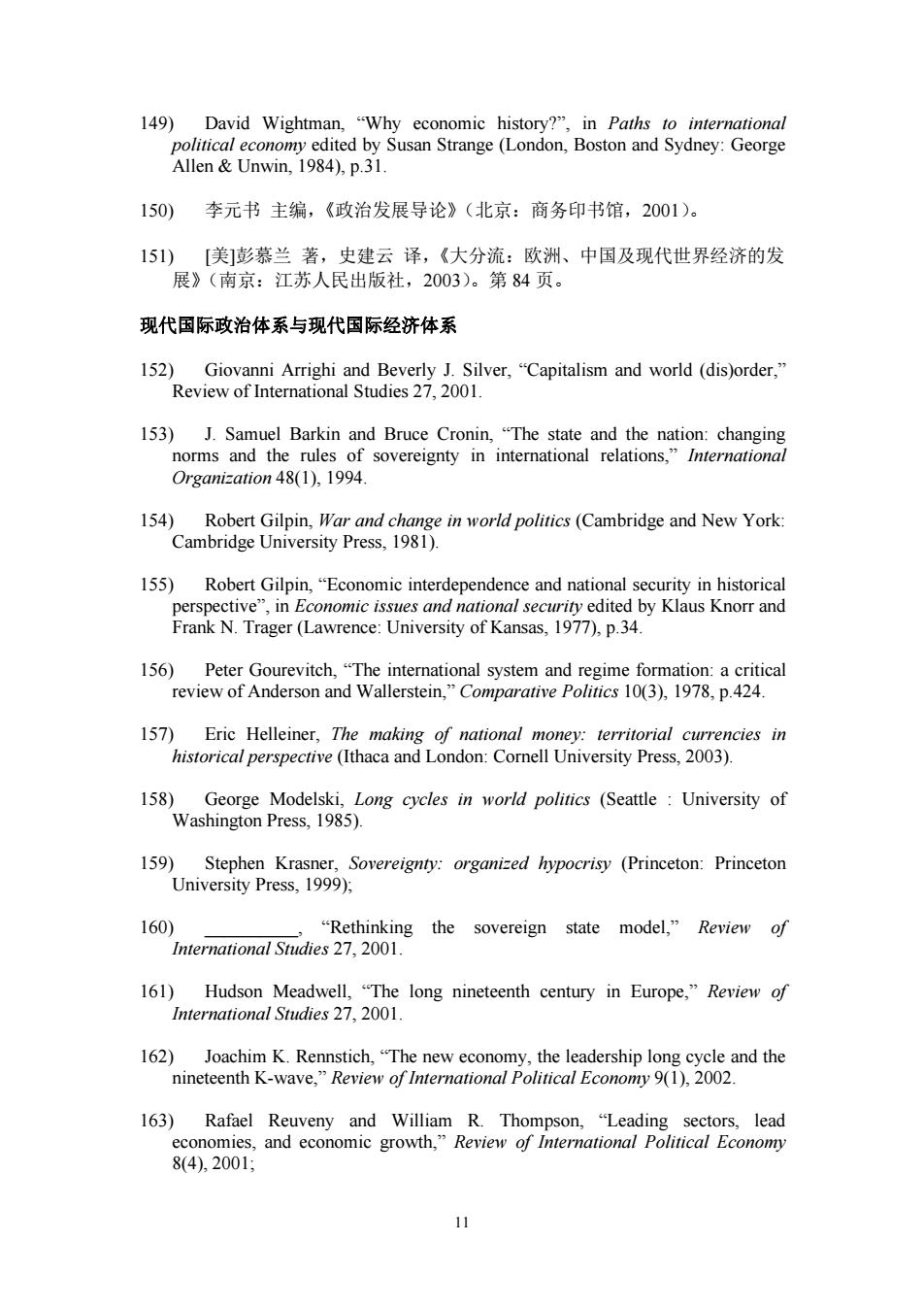
149)David Wightman,"Why economic history?",in Paths to international political economy edited by Susan Strange (London,Boston and Sydney:George Allen Unwin,1984),p.31. 150) 李元书主编,《政治发展导论》(北京:商务印书馆,2001)。 151)[美]彭慕兰著,史建云译,《大分流:欧洲、中国及现代世界经济的发 展》(南京:江苏人民出版社,2003)。第84页。 现代国际政治体系与现代国际经济体系 152)Giovanni Arrighi and Beverly J.Silver,"Capitalism and world (dis)order," Review of International Studies 27,2001. 153)J.Samuel Barkin and Bruce Cronin,"The state and the nation:changing norms and the rules of sovereignty in international relations,"International Organization 48(1),1994. 154)Robert Gilpin,War and change in world politics (Cambridge and New York: Cambridge University Press,1981). 155)Robert Gilpin,"Economic interdependence and national security in historical perspective",in Economic issues and national security edited by Klaus Knorr and Frank N.Trager(Lawrence:University of Kansas,1977),p.34. 156)Peter Gourevitch,"The international system and regime formation:a critical review of Anderson and Wallerstein,"Comparative Politics 10(3),1978,p.424. 157)Eric Helleiner,The making of national money:territorial currencies in historical perspective (Ithaca and London:Cornell University Press,2003). 158)George Modelski,Long cycles in world politics (Seattle University of Washington Press,1985). 159)Stephen Krasner,Sovereignty:organized hypocrisy (Princeton:Princeton University Press,1999); 160) "Rethinking the sovereign state model,"Review of International Studies 27,2001. 161)Hudson Meadwell,"The long nineteenth century in Europe,"Review of International Studies 27,2001. 162)Joachim K.Rennstich,"The new economy,the leadership long cycle and the nineteenth K-wave,"Review of International Political Economy 9(1),2002. 163)Rafael Reuveny and William R.Thompson,"Leading sectors,lead economies,and economic growth,"Review of International Political Economy 8(4),2001; 11
11 149) David Wightman, “Why economic history?”, in Paths to international political economy edited by Susan Strange (London, Boston and Sydney: George Allen & Unwin, 1984), p.31. 150) 李元书 主编,《政治发展导论》(北京:商务印书馆,2001)。 151) [美]彭慕兰 著,史建云 译,《大分流:欧洲、中国及现代世界经济的发 展》(南京:江苏人民出版社,2003)。第 84 页。 现代国际政治体系与现代国际经济体系 152) Giovanni Arrighi and Beverly J. Silver, “Capitalism and world (dis)order,” Review of International Studies 27, 2001. 153) J. Samuel Barkin and Bruce Cronin, “The state and the nation: changing norms and the rules of sovereignty in international relations,” International Organization 48(1), 1994. 154) Robert Gilpin, War and change in world politics (Cambridge and New York: Cambridge University Press, 1981). 155) Robert Gilpin, “Economic interdependence and national security in historical perspective”, in Economic issues and national security edited by Klaus Knorr and Frank N. Trager (Lawrence: University of Kansas, 1977), p.34. 156) Peter Gourevitch, “The international system and regime formation: a critical review of Anderson and Wallerstein,” Comparative Politics 10(3), 1978, p.424. 157) Eric Helleiner, The making of national money: territorial currencies in historical perspective (Ithaca and London: Cornell University Press, 2003). 158) George Modelski, Long cycles in world politics (Seattle : University of Washington Press, 1985). 159) Stephen Krasner, Sovereignty: organized hypocrisy (Princeton: Princeton University Press, 1999); 160) __________, “Rethinking the sovereign state model,” Review of International Studies 27, 2001. 161) Hudson Meadwell, “The long nineteenth century in Europe,” Review of International Studies 27, 2001. 162) Joachim K. Rennstich, “The new economy, the leadership long cycle and the nineteenth K-wave,” Review of International Political Economy 9(1), 2002. 163) Rafael Reuveny and William R. Thompson, “Leading sectors, lead economies, and economic growth,” Review of International Political Economy 8(4), 2001;
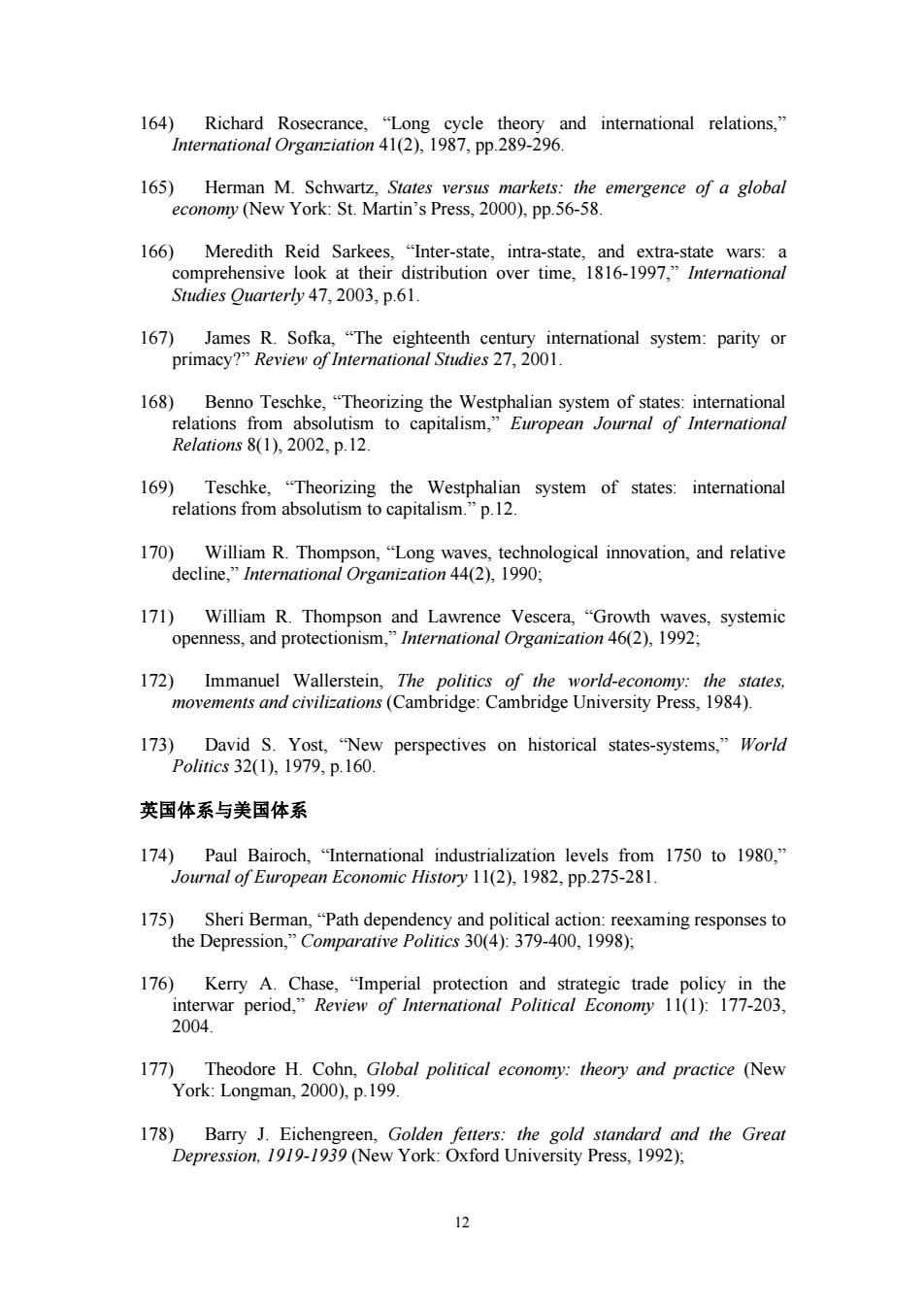
164)Richard Rosecrance,"Long cycle theory and international relations," International Organziation 41(2),1987,pp.289-296. 165)Herman M.Schwartz,States versus markets:the emergence of a global economy (New York:St.Martin's Press,2000),pp.56-58. 166)Meredith Reid Sarkees,"Inter-state,intra-state,and extra-state wars:a comprehensive look at their distribution over time,1816-1997,"International Studies Ouarterly 47,2003,p.61. 167)James R.Sofka,"The eighteenth century international system:parity or primacy?"Review of International Studies 27,2001. 168)Benno Teschke,"Theorizing the Westphalian system of states:international relations from absolutism to capitalism,"European Journal of International Relations 8(1),2002,p.12. 169)Teschke,"Theorizing the Westphalian system of states:international relations from absolutism to capitalism."p.12. 170)William R.Thompson,"Long waves,technological innovation,and relative decline,"International Organization 44(2),1990; 171)William R.Thompson and Lawrence Vescera,"Growth waves,systemic openness,and protectionism,"International Organization 46(2),1992; 172) Immanuel Wallerstein,The politics of the world-economy:the states, movements and civilizations (Cambridge:Cambridge University Press,1984). 173)David S.Yost,"New perspectives on historical states-systems,"World Politics32(1),1979,p.160. 英国体系与美国体系 174)Paul Bairoch,"International industrialization levels from 1750 to 1980," Journal of European Economic History 11(2),1982,pp.275-281. 175)Sheri Berman,"Path dependency and political action:reexaming responses to the Depression,"Comparative Politics 30(4):379-400,1998); 176)Kerry A.Chase,"Imperial protection and strategic trade policy in the interwar period,"Review of International Political Economy 11(1):177-203, 2004. 177)Theodore H.Cohn,Global political economy:theory and practice (New York:Longman,2000),p.199. 178)Barry J.Eichengreen,Golden fetters:the gold standard and the Great Depression,1919-1939 (New York:Oxford University Press,1992); 12
12 164) Richard Rosecrance, “Long cycle theory and international relations,” International Organziation 41(2), 1987, pp.289-296. 165) Herman M. Schwartz, States versus markets: the emergence of a global economy (New York: St. Martin’s Press, 2000), pp.56-58. 166) Meredith Reid Sarkees, “Inter-state, intra-state, and extra-state wars: a comprehensive look at their distribution over time, 1816-1997,” International Studies Quarterly 47, 2003, p.61. 167) James R. Sofka, “The eighteenth century international system: parity or primacy?” Review of International Studies 27, 2001. 168) Benno Teschke, “Theorizing the Westphalian system of states: international relations from absolutism to capitalism,” European Journal of International Relations 8(1), 2002, p.12. 169) Teschke, “Theorizing the Westphalian system of states: international relations from absolutism to capitalism.” p.12. 170) William R. Thompson, “Long waves, technological innovation, and relative decline,” International Organization 44(2), 1990; 171) William R. Thompson and Lawrence Vescera, “Growth waves, systemic openness, and protectionism,” International Organization 46(2), 1992; 172) Immanuel Wallerstein, The politics of the world-economy: the states, movements and civilizations (Cambridge: Cambridge University Press, 1984). 173) David S. Yost, “New perspectives on historical states-systems,” World Politics 32(1), 1979, p.160. 英国体系与美国体系 174) Paul Bairoch, “International industrialization levels from 1750 to 1980,” Journal of European Economic History 11(2), 1982, pp.275-281. 175) Sheri Berman, “Path dependency and political action: reexaming responses to the Depression,” Comparative Politics 30(4): 379-400, 1998); 176) Kerry A. Chase, “Imperial protection and strategic trade policy in the interwar period,” Review of International Political Economy 11(1): 177-203, 2004. 177) Theodore H. Cohn, Global political economy: theory and practice (New York: Longman, 2000), p.199. 178) Barry J. Eichengreen, Golden fetters: the gold standard and the Great Depression, 1919-1939 (New York: Oxford University Press, 1992);
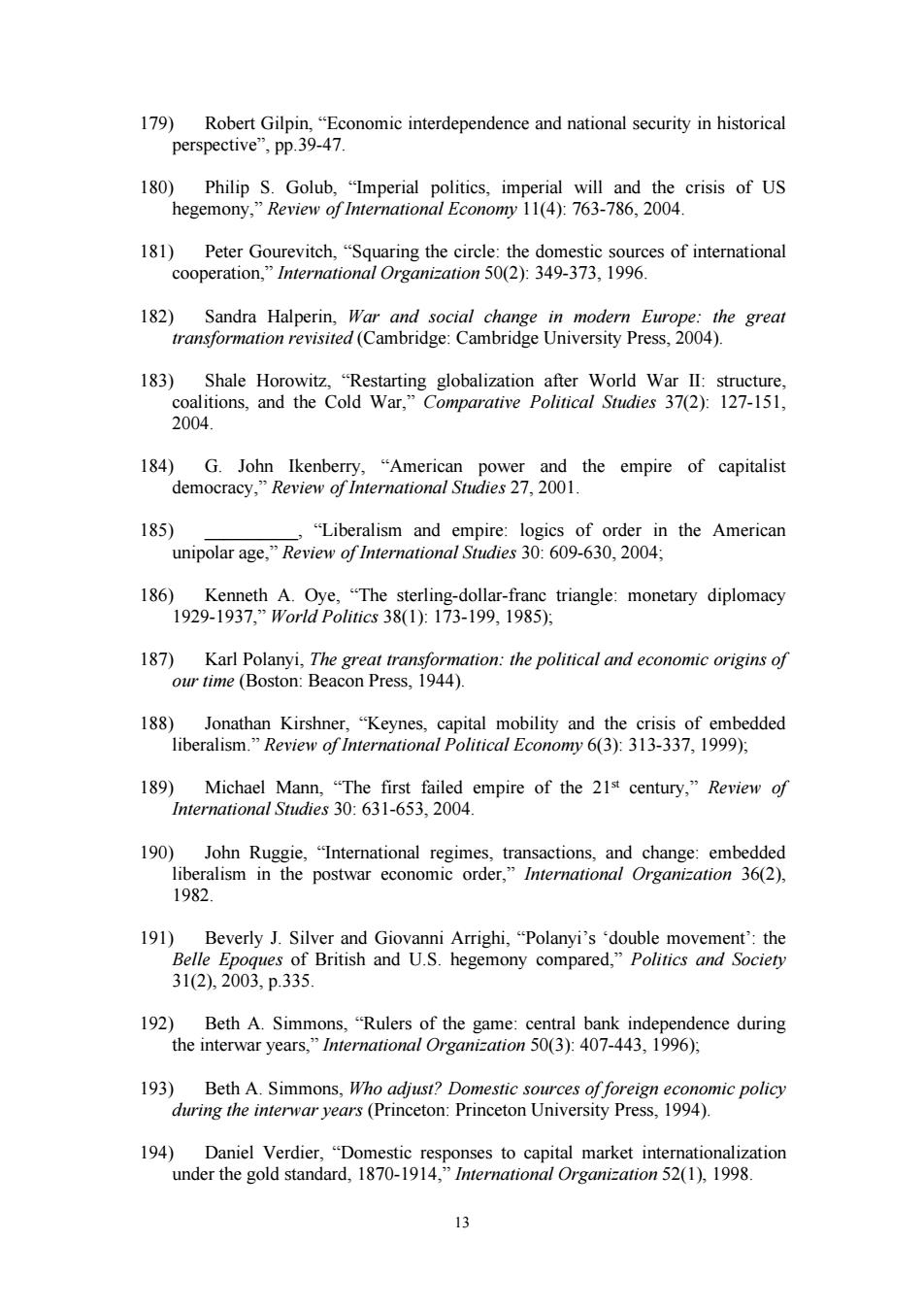
179)Robert Gilpin,"Economic interdependence and national security in historical perspective",pp.39-47. 180)Philip S.Golub,"Imperial politics,imperial will and the crisis of US hegemony,"Review of International Economy 11(4):763-786,2004. 181)Peter Gourevitch,"Squaring the circle:the domestic sources of international cooperation,"International Organization 50(2):349-373,1996. 182)Sandra Halperin,War and social change in modern Europe:the great transformation revisited (Cambridge:Cambridge University Press,2004). 183)Shale Horowitz,"Restarting globalization after World War II:structure, coalitions,and the Cold War,"Comparative Political Studies 37(2):127-151, 2004. 184)G.John Ikenberry,"American power and the empire of capitalist democracy,"Review of International Studies 27,2001. 185) "Liberalism and empire:logics of order in the American unipolar age,"Review of International Studies 30:609-630,2004; 186)Kenneth A.Oye,"The sterling-dollar-franc triangle:monetary diplomacy 1929-1937,”World Politics381):173-199,1985), 187)Karl Polanyi,The great transformation:the political and economic origins of our time (Boston:Beacon Press,1944). 188)Jonathan Kirshner,"Keynes,capital mobility and the crisis of embedded liberalism."Review of International Political Economy 6(3):313-337,1999); 189)Michael Mann,"The first failed empire of the 21st century,"Review of International Studies 30:631-653,2004. 190)John Ruggie,"International regimes,transactions,and change:embedded liberalism in the postwar economic order,"International Organization 36(2), 1982. 191)Beverly J.Silver and Giovanni Arrighi,"Polanyi's 'double movement':the Belle Epoques of British and U.S.hegemony compared,"Politics and Society 31(2),2003,p.335. 192)Beth A.Simmons,"Rulers of the game:central bank independence during the interwar years,"International Organization 50(3):407-443,1996); 193)Beth A.Simmons,Who adjust?Domestic sources of foreign economic policy during the interwar years (Princeton:Princeton University Press,1994). 194)Daniel Verdier,"Domestic responses to capital market internationalization under the gold standard,1870-1914,"International Organization 52(1),1998. 13
13 179) Robert Gilpin, “Economic interdependence and national security in historical perspective”, pp.39-47. 180) Philip S. Golub, “Imperial politics, imperial will and the crisis of US hegemony,” Review of International Economy 11(4): 763-786, 2004. 181) Peter Gourevitch, “Squaring the circle: the domestic sources of international cooperation,” International Organization 50(2): 349-373, 1996. 182) Sandra Halperin, War and social change in modern Europe: the great transformation revisited (Cambridge: Cambridge University Press, 2004). 183) Shale Horowitz, “Restarting globalization after World War II: structure, coalitions, and the Cold War,” Comparative Political Studies 37(2): 127-151, 2004. 184) G. John Ikenberry, “American power and the empire of capitalist democracy,” Review of International Studies 27, 2001. 185) __________, “Liberalism and empire: logics of order in the American unipolar age,” Review of International Studies 30: 609-630, 2004; 186) Kenneth A. Oye, “The sterling-dollar-franc triangle: monetary diplomacy 1929-1937,” World Politics 38(1): 173-199, 1985); 187) Karl Polanyi, The great transformation: the political and economic origins of our time (Boston: Beacon Press, 1944). 188) Jonathan Kirshner, “Keynes, capital mobility and the crisis of embedded liberalism.” Review of International Political Economy 6(3): 313-337, 1999); 189) Michael Mann, “The first failed empire of the 21 st century,” Review of International Studies 30: 631-653, 2004. 190) John Ruggie, “International regimes, transactions, and change: embedded liberalism in the postwar economic order,” International Organization 36(2), 1982. 191) Beverly J. Silver and Giovanni Arrighi, “Polanyi’s ‘double movement’: the Belle Epoques of British and U.S. hegemony compared,” Politics and Society 31(2), 2003, p.335. 192) Beth A. Simmons, “Rulers of the game: central bank independence during the interwar years,” International Organization 50(3): 407-443, 1996); 193) Beth A. Simmons, Who adjust? Domestic sources of foreign economic policy during the interwar years (Princeton: Princeton University Press, 1994). 194) Daniel Verdier, “Domestic responses to capital market internationalization under the gold standard, 1870-1914,” International Organization 52(1), 1998
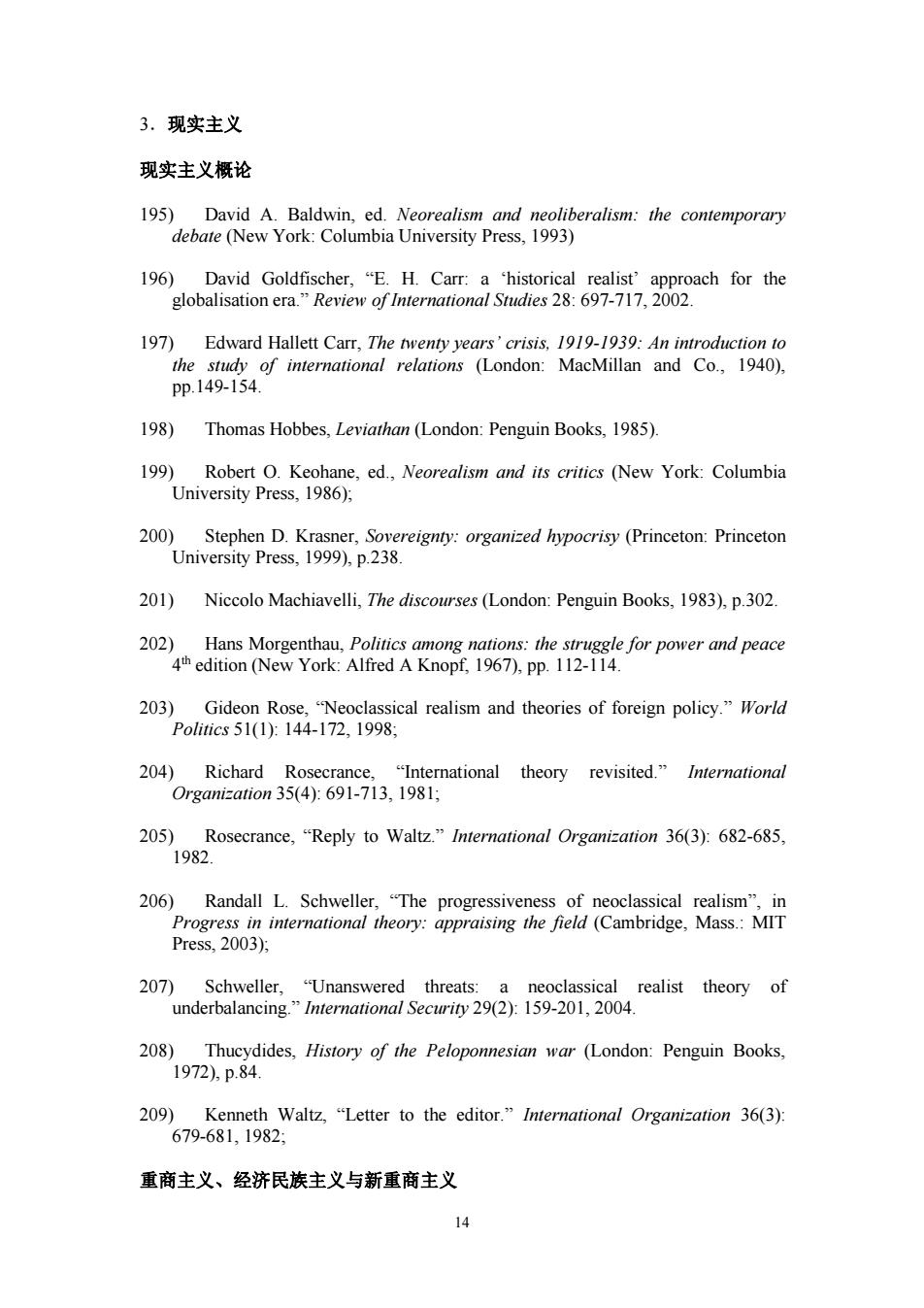
3.现实主义 现实主义概论 195) David A.Baldwin,ed.Neorealism and neoliberalism:the contemporary debate (New York:Columbia University Press,1993) 196)David Goldfischer,"E.H.Carr:a historical realist'approach for the globalisation era."Review of International Studies 28:697-717,2002 197)Edward Hallett Carr,The twenty years'crisis,1919-1939:An introduction to the study of international relations (London:MacMillan and Co.,1940), pp.149-154. 198) Thomas Hobbes,Leviathan (London:Penguin Books,1985). 199)Robert O.Keohane,ed.,Neorealism and its critics (New York:Columbia University Press,1986); 200)Stephen D.Krasner,Sovereignty:organized hypocrisy (Princeton:Princeton University Press,1999),p.238. 201)Niccolo Machiavelli,The discourses (London:Penguin Books,1983),p.302. 202)Hans Morgenthau,Politics among nations:the struggle for power and peace 4th edition (New York:Alfred A Knopf,1967),pp.112-114. 203)Gideon Rose,"Neoclassical realism and theories of foreign policy."World Politics51(1):144-172,1998; 204)Richard Rosecrance,"International theory revisited."International Organization35(4):691-713,1981; 205) Rosecrance,"Reply to Waltz."International Organization 36(3):682-685, 1982. 206)Randall L.Schweller,"The progressiveness of neoclassical realism",in Progress in international theory:appraising the field (Cambridge,Mass.:MIT Press,2003); 207)Schweller,"Unanswered threats:a neoclassical realist theory of underbalancing."International Security 29(2):159-201,2004. 208) Thucydides,History of the Peloponnesian war (London:Penguin Books, 1972),p.84 209)Kenneth Waltz,"Letter to the editor."International Organization 36(3): 679-681,1982, 重商主义、经济民族主义与新重商主义 14
14 3.现实主义 现实主义概论 195) David A. Baldwin, ed. Neorealism and neoliberalism: the contemporary debate (New York: Columbia University Press, 1993) 196) David Goldfischer, “E. H. Carr: a ‘historical realist’ approach for the globalisation era.” Review of International Studies 28: 697-717, 2002. 197) Edward Hallett Carr, The twenty years’ crisis, 1919-1939: An introduction to the study of international relations (London: MacMillan and Co., 1940), pp.149-154. 198) Thomas Hobbes, Leviathan (London: Penguin Books, 1985). 199) Robert O. Keohane, ed., Neorealism and its critics (New York: Columbia University Press, 1986); 200) Stephen D. Krasner, Sovereignty: organized hypocrisy (Princeton: Princeton University Press, 1999), p.238. 201) Niccolo Machiavelli, The discourses (London: Penguin Books, 1983), p.302. 202) Hans Morgenthau, Politics among nations: the struggle for power and peace 4 th edition (New York: Alfred A Knopf, 1967), pp. 112-114. 203) Gideon Rose, “Neoclassical realism and theories of foreign policy.” World Politics 51(1): 144-172, 1998; 204) Richard Rosecrance, “International theory revisited.” International Organization 35(4): 691-713, 1981; 205) Rosecrance, “Reply to Waltz.” International Organization 36(3): 682-685, 1982. 206) Randall L. Schweller, “The progressiveness of neoclassical realism”, in Progress in international theory: appraising the field (Cambridge, Mass.: MIT Press, 2003); 207) Schweller, “Unanswered threats: a neoclassical realist theory of underbalancing.” International Security 29(2): 159-201, 2004. 208) Thucydides, History of the Peloponnesian war (London: Penguin Books, 1972), p.84. 209) Kenneth Waltz, “Letter to the editor.” International Organization 36(3): 679-681, 1982; 重商主义、经济民族主义与新重商主义
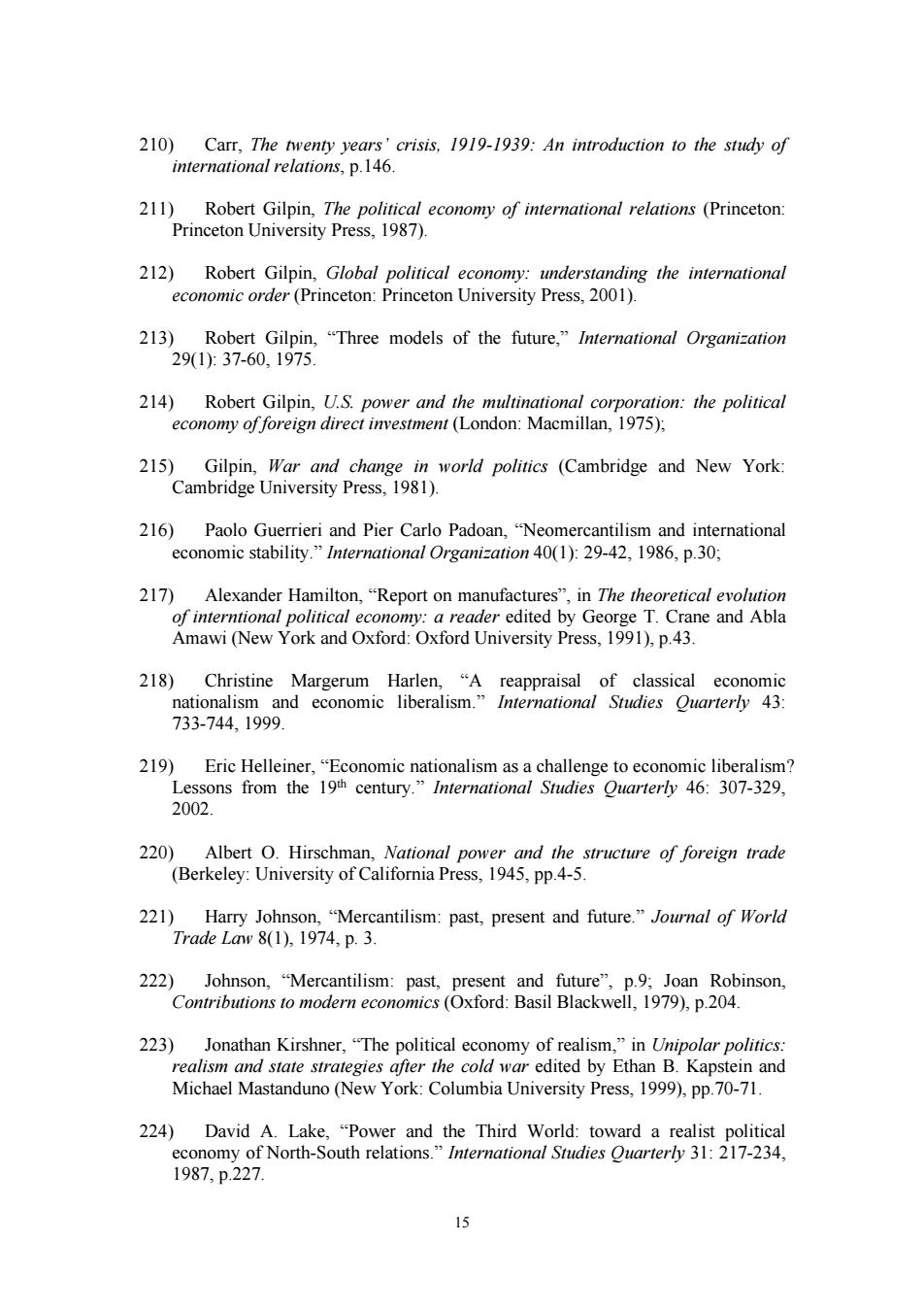
210)Carr,The twenty years'crisis,1919-1939:An introduction to the study of international relations,p.146. 211)Robert Gilpin,The political economy of international relations (Princeton: Princeton University Press,1987). 212)Robert Gilpin,Global political economy:understanding the international economic order(Princeton:Princeton University Press,2001). 213)Robert Gilpin,"Three models of the future,"International Organization 29(1)37-60,1975. 214)Robert Gilpin,U.S.power and the multinational corporation:the political economy offoreign direct investment (London:Macmillan,1975); 215)Gilpin,War and change in world politics (Cambridge and New York: Cambridge University Press,1981). 216)Paolo Guerrieri and Pier Carlo Padoan,"Neomercantilism and international economic stability."International Organization 40(1):29-42,1986,p.30; 217)Alexander Hamilton,"Report on manufactures",in The theoretical evolution of interntional political economy:a reader edited by George T.Crane and Abla Amawi (New York and Oxford:Oxford University Press,1991),p.43. 218)Christine Margerum Harlen,"A reappraisal of classical economic nationalism and economic liberalism."International Studies Ouarterly 43: 733-744.1999. 219)Eric Helleiner,"Economic nationalism as a challenge to economic liberalism? Lessons from the 19th century."International Studies Ouarterly 46:307-329, 2002. 220)Albert O.Hirschman,National power and the structure of foreign trade (Berkeley:University of California Press,1945,pp.4-5. 221)Harry Johnson,"Mercantilism:past,present and future."Journal of World Trade Law 8(1),1974,p.3. 222)Johnson,"Mercantilism:past,present and future",p.9;Joan Robinson, Contributions to modern economics (Oxford:Basil Blackwell,1979),p.204. 223)Jonathan Kirshner,"The political economy of realism,"in Unipolar politics: realism and state strategies after the cold war edited by Ethan B.Kapstein and Michael Mastanduno (New York:Columbia University Press,1999),pp.70-71. 224)David A.Lake,"Power and the Third World:toward a realist political economy of North-South relations."International Studies Ouarterly 31:217-234, 1987,p.227. 15
15 210) Carr, The twenty years’ crisis, 1919-1939: An introduction to the study of international relations, p.146. 211) Robert Gilpin, The political economy of international relations (Princeton: Princeton University Press, 1987). 212) Robert Gilpin, Global political economy: understanding the international economic order (Princeton: Princeton University Press, 2001). 213) Robert Gilpin, “Three models of the future,” International Organization 29(1): 37-60, 1975. 214) Robert Gilpin, U.S. power and the multinational corporation: the political economy of foreign direct investment (London: Macmillan, 1975); 215) Gilpin, War and change in world politics (Cambridge and New York: Cambridge University Press, 1981). 216) Paolo Guerrieri and Pier Carlo Padoan, “Neomercantilism and international economic stability.” International Organization 40(1): 29-42, 1986, p.30; 217) Alexander Hamilton, “Report on manufactures”, in The theoretical evolution of interntional political economy: a reader edited by George T. Crane and Abla Amawi (New York and Oxford: Oxford University Press, 1991), p.43. 218) Christine Margerum Harlen, “A reappraisal of classical economic nationalism and economic liberalism.” International Studies Quarterly 43: 733-744, 1999. 219) Eric Helleiner, “Economic nationalism as a challenge to economic liberalism? Lessons from the 19 th century.” International Studies Quarterly 46: 307-329, 2002. 220) Albert O. Hirschman, National power and the structure of foreign trade (Berkeley: University of California Press, 1945, pp.4-5. 221) Harry Johnson, “Mercantilism: past, present and future.” Journal of World Trade Law 8(1), 1974, p. 3. 222) Johnson, “Mercantilism: past, present and future”, p.9; Joan Robinson, Contributions to modern economics (Oxford: Basil Blackwell, 1979), p.204. 223) Jonathan Kirshner, “The political economy of realism,” in Unipolar politics: realism and state strategies after the cold war edited by Ethan B. Kapstein and Michael Mastanduno (New York: Columbia University Press, 1999), pp.70-71. 224) David A. Lake, “Power and the Third World: toward a realist political economy of North-South relations.” International Studies Quarterly 31: 217-234, 1987, p.227